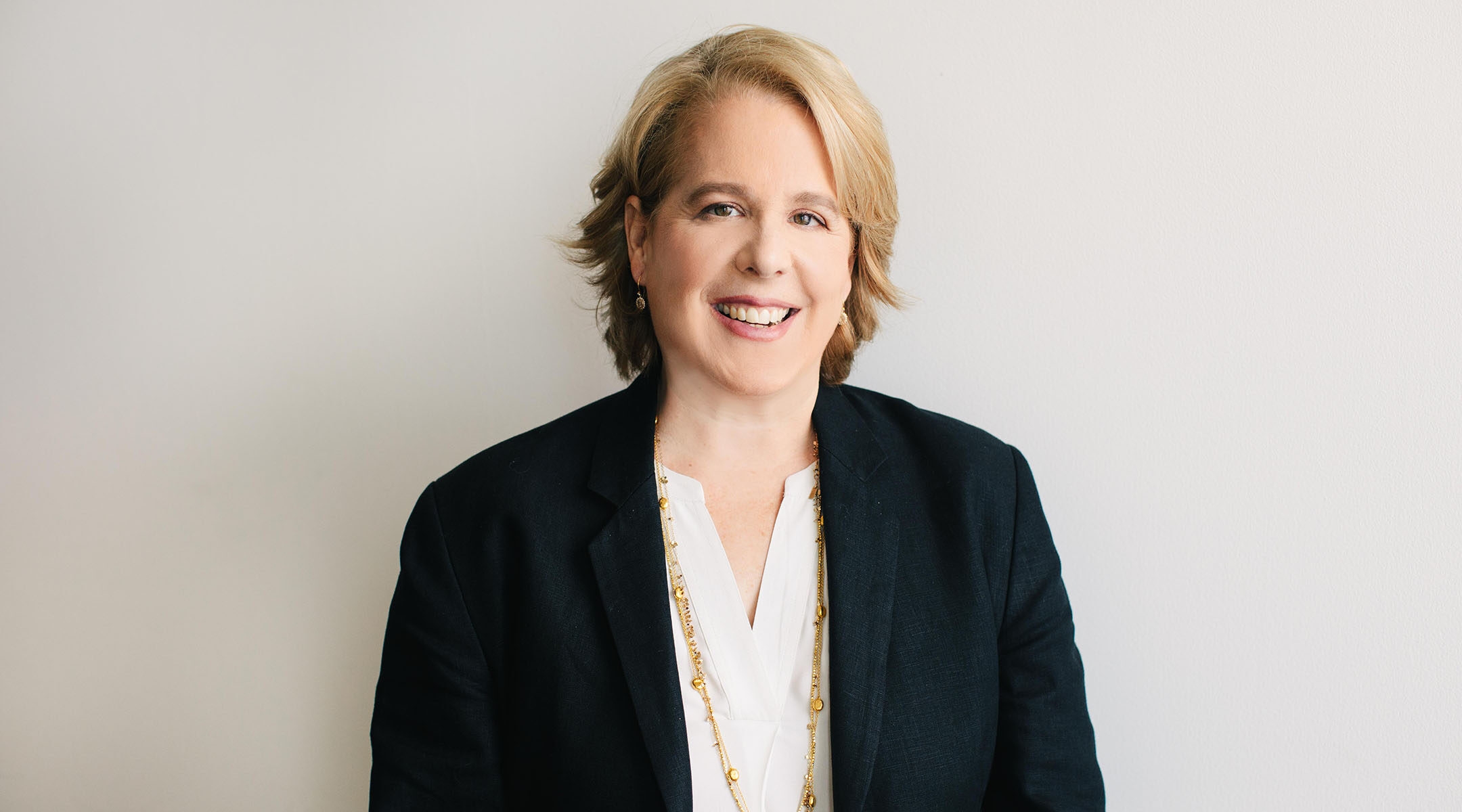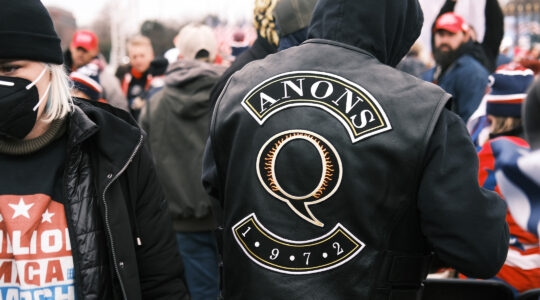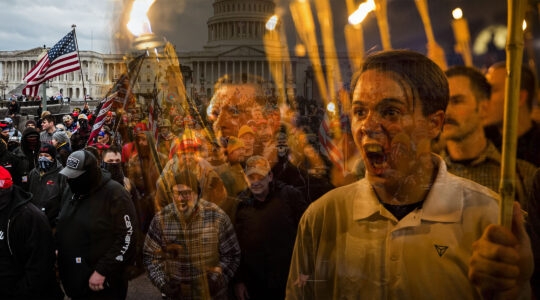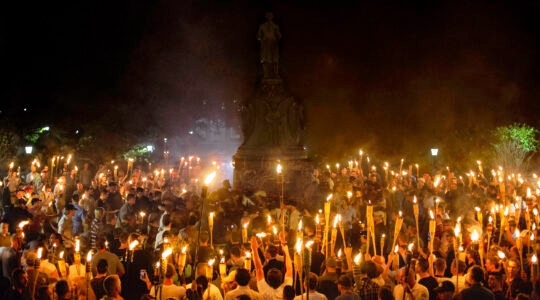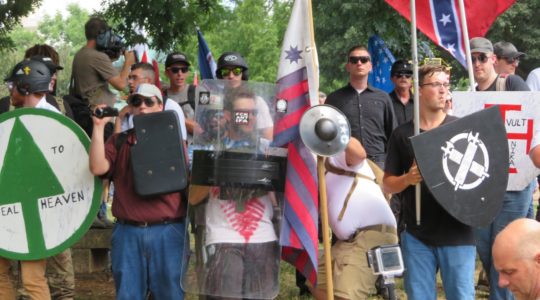(JTA) — When I interviewed Roberta Kaplan on Dec. 15, neither of us might have guessed how frighteningly prescient her words would be.
Kaplan has had a prolific legal career, representing corporate giants and cultural icons alike. Formerly a litigation partner at Paul, Weiss, a top Manhattan-based law firm, she formed her own firm in 2017 to handle public interest cases as well as commercial litigation. In recent years, she has been raising the alarm about the dangers of domestic terrorism, and made headlines for suing the organizers of the 2017 “Unite the Right” rally in Charlottesville.
In December, Kaplan’s firm filed a U.S. Supreme Court brief defending the Commonwealth of Pennsylvania against claims of election fraud, and is also representing Mary Trump, President Trump’s cousin, and E. Jean Carroll, who has accused the former president of rape, in civil cases against him.
“I don’t think I appreciated when we brought this [Charlottesville] case the degree to which it has become a harbinger of so many of the troubling things we are seeing in our country today,” Kaplan told me just weeks before a pro-Trump mob broke into the Capitol building. “In ways that I never anticipated, Charlottesville has become a predictor, and sadly a symbol, of so many of the very serious problems that plague our society.”
Many across the political spectrum are hoping that the Biden presidency will bring with it a return to civility. But Kaplan reminds us why, until we face the most violent forces at work in our society today, we shouldn’t get too comfortable just yet.
This interview has been edited for length and clarity.
JTA: In August 2017, within months of opening your law firm, Kaplan Hecker & Fink, the Charlottesville rally took place. What you were thinking and feeling? And what did you do as you were watching it unfold?
Kaplan: The Monday after, I decided — looking back on it, somewhat naively — that we would all have lunch together and order in pizza and watch the press coverage of what had happened in Charlottesville. I say naively because it was shocking to everyone. And I remember one of the paralegals had to leave the room, they were very upset by the whole thing.
But as I was watching what happened that weekend, the thought immediately occurred to me that something needed to be done about it. And I was very concerned that then-Attorney General Jeff Sessions, who does not exactly have a great record on civil rights, to say the least, was not going to be devoting a lot of Department of Justice resources to investigating and prosecuting the widespread conspiracy that had happened.
In keeping with my nature, I said to myself, if the DOJ is not going to do it, then I will.
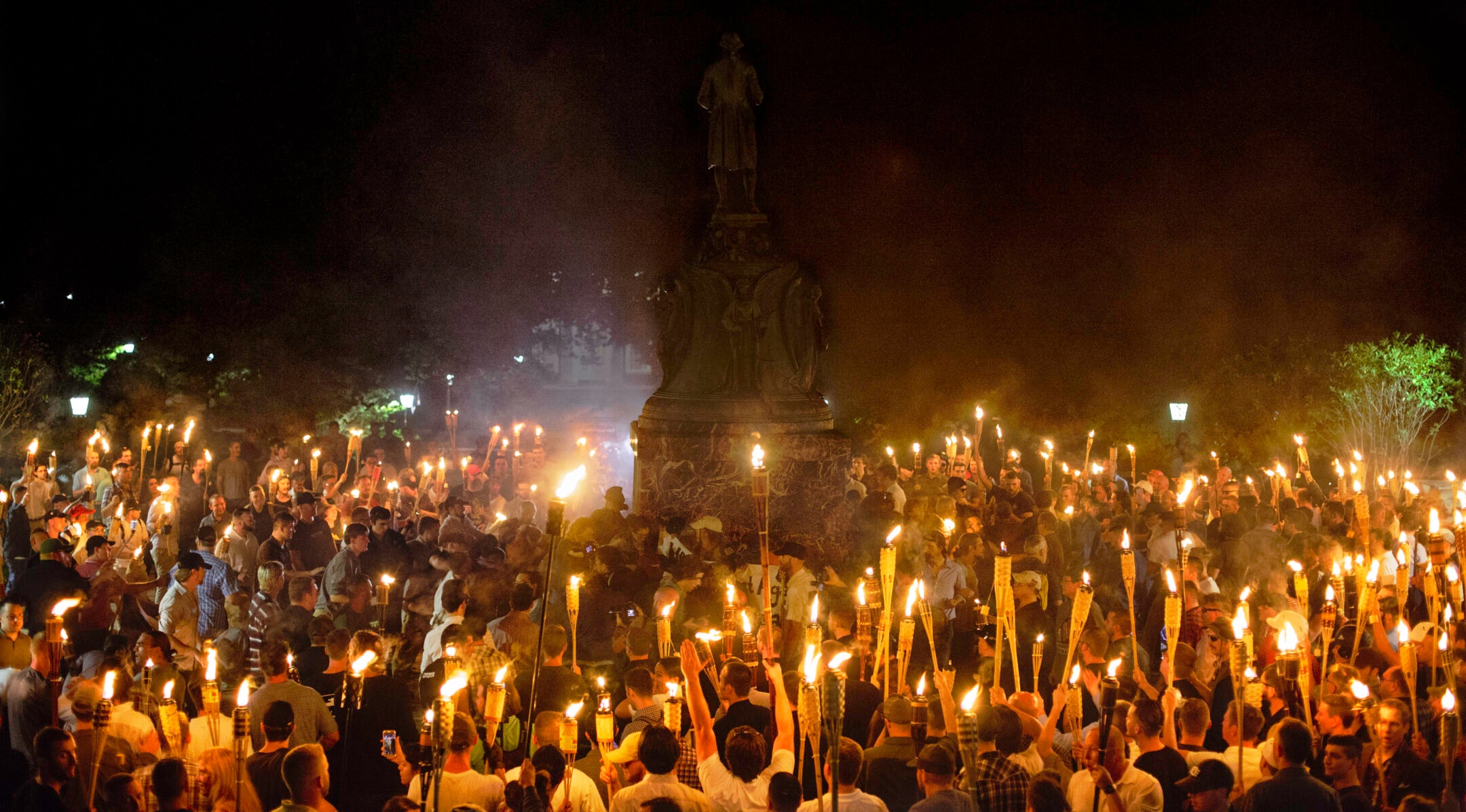
Neo-Nazis and white supremacists encircle counterprotesters at the base of a statue of Thomas Jefferson after marching through the University of Virginia campus with torches in Charlottesville, Va., Aug. 11, 2017. (Shay Horse/NurPhoto via Getty Images)
I also thought back to a case that a mentor of mine at Paul, Weiss had done in the early days of the internet. A website that was called the Nuremberg Files, believe it or not, had on it the names, personal contact information and photos of doctors who performed abortions, mostly in the West and South. When those doctors were hurt — and one of them was killed — they would put a red X over those doctors. The argument in that case was that [the website] was a violation of the Violence Against Women Act, and it was obviously incitement to do violence against other doctors on the site.
And I thought to myself, could we use something like that here? In the end, a huge, multimillion-dollar judgment was sustained against the defendants, and Paul, Weiss had devoted significant resources to enforcing that judgment by following defendants around and seizing their homes and garnishing their wages.
So in the Charlottesville case, we got a very lucky break. Someone managed to get into the Discord chat that the organizers of Charlottesville used to plan Charlottesville going back for weeks before Aug. 11 and 12, and published those chats on a website called Unicorn Riot.
Typically in cases, you don’t get discovery [the formal process of obtaining evidence from the parties] before you file a complaint. But here, this stuff was out there, so we effectively had a lot of documents that we wouldn’t otherwise have.
With all of those pieces in place, I called Dahlia Lithwick, who is a good friend, who writes about the Supreme Court and other issues for Slate. At the time, she lived in Charlottesville and had lived there for a long time.
I said, look, I have this crazy idea in my head. What do you think? And she says I think it’s a great idea. Why don’t I introduce you to some folks? Within 48 or 72 hours, we were on a plane to Charlottesville.
When we arrived, the town was really still in shock. A lot of the men — and it’s fair to say there were very few women — who descended upon Charlottesville that weekend to commit racialized or racially motivated violence drove around town in these all-white Mercedes vans. When we were there several days later, those vans were still driving around town, particularly in the African-American neighborhoods.
So people were still freaked out, to use a fancy legal term. We met with a whole bunch of people, several of whom became plaintiffs in our case. That includes Rev. Seth Wispelwey, who during the weeks leading up to Charlottesville and during the events on Aug. 11 and 12 organized these huge interfaith protests against what was going on with rabbis and others.
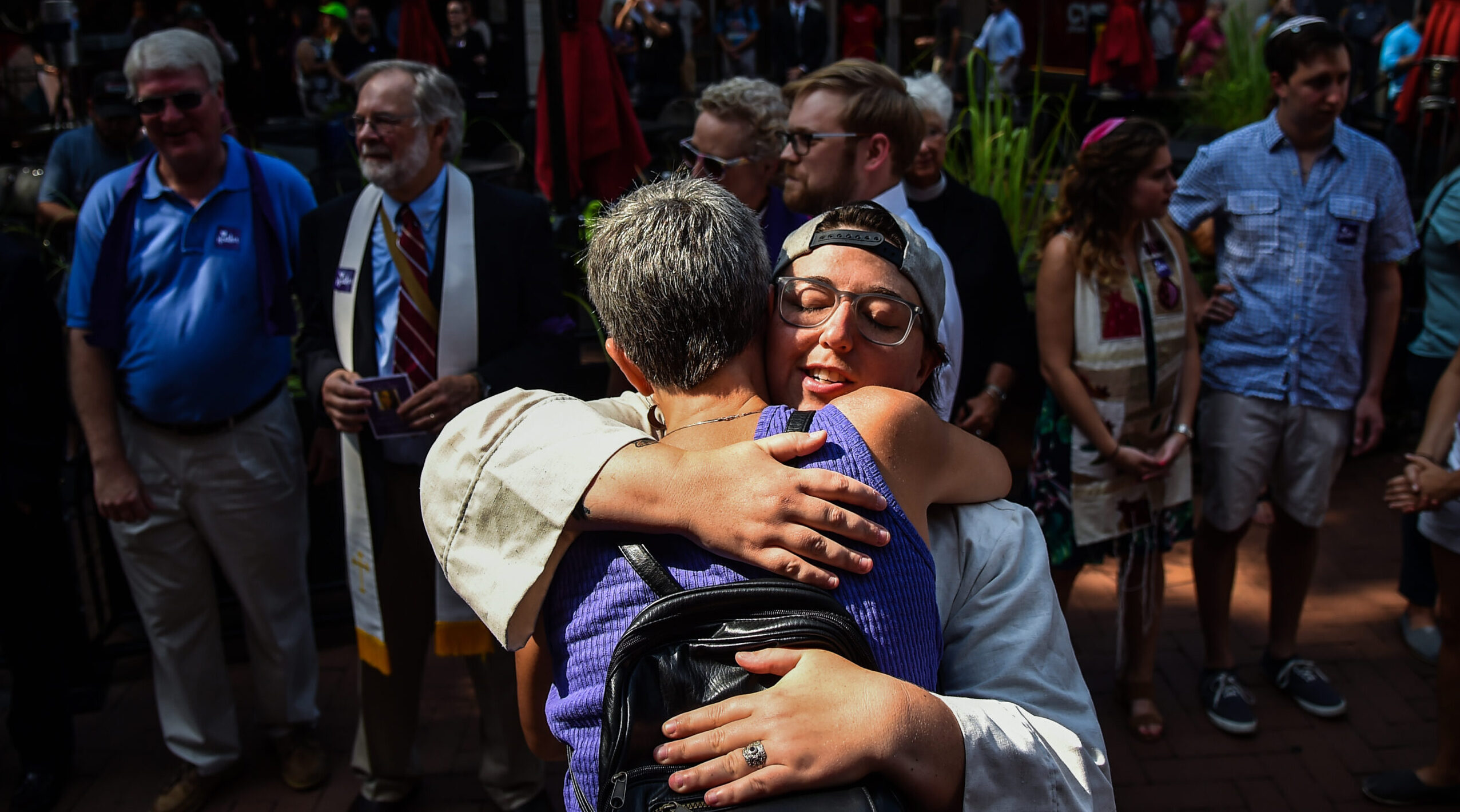
Brittany Caine-Conley hugs a member of the local church outside the Paramount Theater, where a funeral service was held for Heather Heyer, a counterprotester of the pro-right rally in Charlottesville, Aug. 16, 2017. (Salwan Georges/The Washington Post via Getty Images)
But it was a really intense trip. When we were driving back to the airport, one of the associates in the car was crying. I remember saying to her, “Buck up. You’ve got a lot of work to do. We’ve all got to buck up and be tough and do this case.”
What is the relationship between your law firm and Integrity First America, the civil rights group backing your federal lawsuit?
There’s only one case in which we have a relationship with Integrity First America, and that’s the Charlottesville case. When I came back to New York, I realized that this was going to be an expensive proposition. I’ve been involved with the people who were starting IFA, but I’ve never had a position there. I suggested to Integrity First that this might be the kind of case they’d be interested in getting involved in.
A lot of the expenses related to the case mostly fall into two big buckets. One is security for lawyers, plaintiffs and experts — [Holocaust scholar] Deborah Lipstadt, for example, is an expert in our case. The security costs of making sure that all of those people are safe are substantial, to say the least.
Two, the defendants in our case have the mentality of … maybe teenage juvenile delinquents, and they refuse to comply with court orders about discovery. In fact, one of them has been jailed and a bunch of them have been sanctioned about it. But ultimately, in order to get any evidence from them at all, we had to agree to pay the costs of getting their devices — their laptops, their phones, etc. — and having those devices sent to a vendor who then scraped the data from the devices and then ran the searches that the parties had agreed on. It’s like $500 per device to do that.
Kaplan Hecker & Fink officially opened in July of 2017. President Trump assumed office in January of 2017. Was the timing coincidental, or did his election play a role in your decision to start your own firm?
It definitely is not coincidental.
I’ve been thinking for some time that I wanted to create a firm like Kaplan Hecker & Fink. But I thought that before I did something like that, I would first, if I could, have the privilege of serving in what I thought was going to be the Clinton administration. [laughs]
And so I was very hopeful, had Hillary been elected, that I would have been honored to get a job in the Justice Department and to work for our first woman president in that capacity. When that didn’t happen, it kind of forced the matter. And so then I began to think more and more about what I wanted to do with the rest of my life. And what I wanted to do with the rest of my life was to practice law the way that our firm is currently practicing.
What are some of the hallmarks of what your firm is trying to do?
I believe very strongly, and Paul, Weiss had a culture that believed very strongly, that every lawyer has an obligation to serve the public interest in some capacity. Whether that’s through pro bono cases, like the Windsor case that I did at Paul, Weiss [leading to the legalization of marriage equality], or whether it’s serving on bar committees, or other things like that, it’s important that every lawyer — certainly every litigator — do something positive to support the administration of justice in our society.
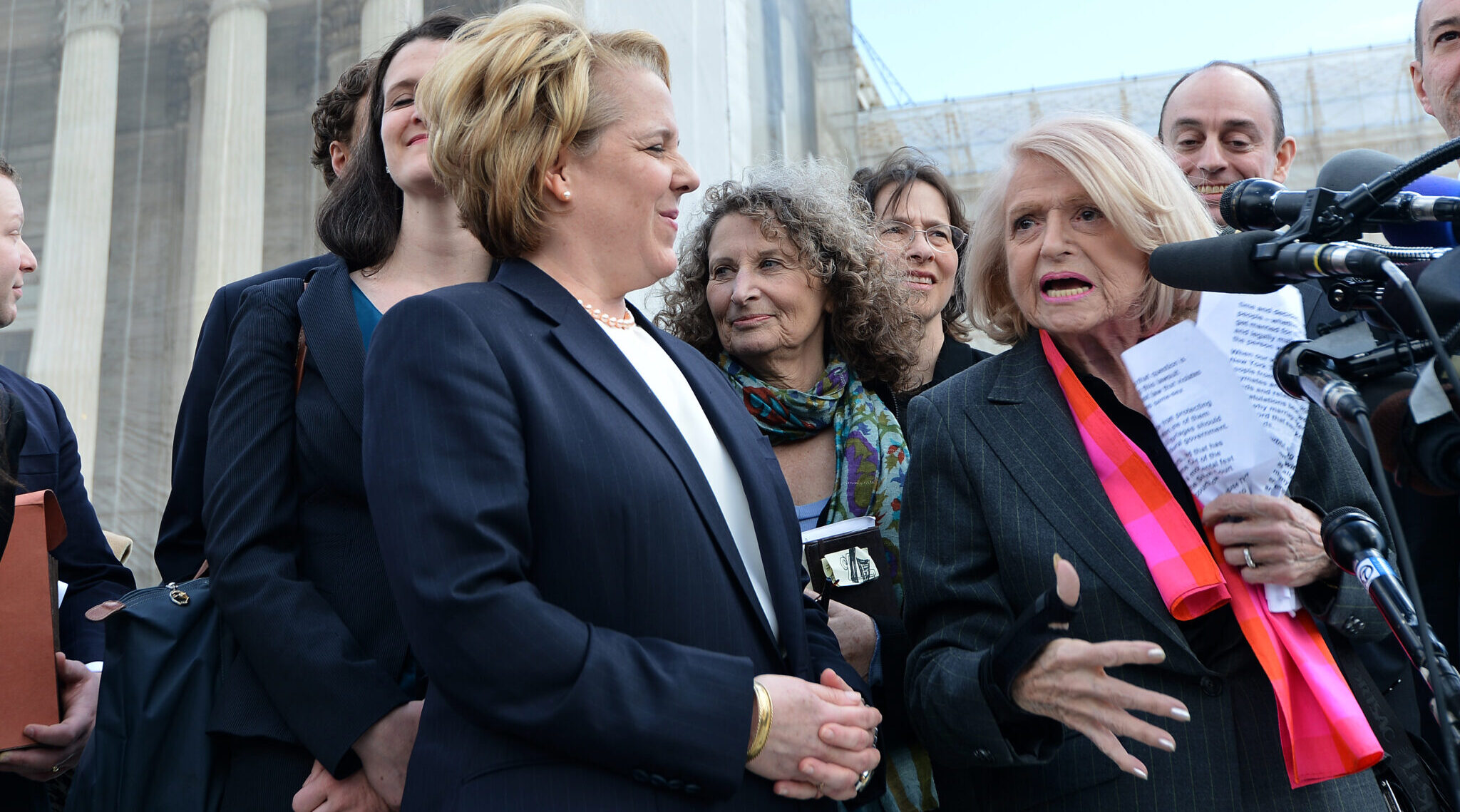
Edie Windsor, right, an 83-year-old lesbian widower, makes a statement to the media as her lawyer Roberta Kaplan looks on in front of the Supreme Court in Washington, March 27, 2013. (AFP/Jewel Samad via Getty Images)
And even when I left to start the firm, While I didn’t expect it to be good, that’s for sure, I don’t think I fully contemplated or could have imagined the many serious threats to our Constitution and to our justice system that the Trump administration posed — including the challenge to the votes of the American people.
So I thought from the very beginning that, even putting Trump aside, that our firm would be one that was very dedicated to doing work that’s in the public interest. And not just run-of-the-mill pro bono cases like many firms do — I’m not criticizing those cases, they are important. But we aim for high-impact cases that really make a broader impact on society rather than just affecting one litigant.
Two, I believe very strongly in my heart and in my bones that the same skills that I put to litigating for Airbnb or Uber, or Goldman Sachs, or you name it, we at our firm should use the same resources and time and care to the cases of Mary Trump and E. Jean Carroll and the plaintiffs in the Charlottesville case, and other public interest cases.
I had a sense that if you created a firm with that as the cornerstone, you would be able to attract really incredibly talented lawyers who will want to practice law that way, and I’m proud to say that has certainly been the case for us.
I get the sense reading your case history that you also — and correct me if I’m wrong — are very much a spring-into-action-quickly type of person.
There’s a joke in my law firm: “Robbie acts.” One of my friends was counseling a more junior partner, saying that “if you say something to Robbie, you better make sure that it has support because she may act on it.”
Even before the Windsor case, but I certainly saw while working on the Windsor case how a small group of dedicated, smart lawyers can make fundamental change.
Returning to the Charlottesville case, where does it stand?
There have been a lot of sanctions in the case. Elliot Kline (an organizer of the Unite the Right rally] was put in jail for a couple of days. And a lot of the other defendants have had monetary sanctions awarded against them. But the most recent ruling is a big deal because the judge ordered what are called adverse inferences.
That is a very, very negative development for the defendants in the case.
What that means is when we get to a jury trial — this spring, we hope, but likely fall because of COVID-19 — the judge will instruct the jurors that certain facts in the case that we allege they have to assume are true. Those facts include things like that Kline, who was one of the two ringleaders of the conspiracy, was motivated by animus against racial minorities, Jewish people and their supporters, and conspired to engage in acts of intimidation and violence on Aug. 11 and 12 in Charlottesville; that it was reasonably foreseeable to Kline and intended by Kline that his co-conspirators would commit acts of racially motivated violence and intimidation at the torchlight event on Aug. 11; that it was reasonably foreseeable and intended by him that co-conspirators would commit acts of violence at the Unite the Right event on Aug. 12, etc., etc.
And that kind of a sanction is very rare. It’s very hard to get. But it’s evidence of the kind of contempt for court orders and normal court processes that defendants in this case have shown throughout the case.
What are both the short-term and long-term goals in bringing this case?
Short term, our goal is to have a jury trial. We were supposed to have one this past fall; that obviously didn’t take place because of COVID. Our clients have been waiting a very long time. No civil cases move quickly, but this case is moving much slower than most because of the defendants’ intransigence. It’s really time to get the show on the road and get this going.
Long term, we really hope that the trial will be a wake-up call for Americans who have not — and certainly for Jews who have not — appreciated how dangerous this threat was and continues to be.
One of the reasons why I did this case is to deter other white supremacists, neo-Nazis and others from trying to organize anything like Charlottesville ever again. And making them understand that if they do, these will be the consequences.
Some of the defendants in this case have already complained about how hard this trial is making it for them to organize and to raise money, people like Richard Spencer. And to our knowledge, none of them participated in person in the events at the Capitol on January 6. In other words, they at least have been deterred.
It’s pretty hard to surprise me. I’ve been practicing law for a long time, I’ve seen a lot and I’m not exactly a spring chicken anymore. So my skin tends to be pretty thick. But the one part of this case, I have to say, that truly astounded me was once we got into the defendants’ text messages and emails back and forth, it was astounding to me that something like 90% of the discriminatory hateful things they say are directed at the Jews.
That’s not to say that they don’t hate Black people, that they don’t hate Muslim people, that they’re not crazy about immigrants. But their overwhelming, overriding passion is anti-Semitism. And what was so shocking to me about that, among other things, was that most of them come from rural communities from all over the country. So I assume that most of them don’t know many Jewish people. And the idea that there was this kind of underwater river of virulent anti-Semitism in our country was shocking.
The other thing that surprised me over time is that I don’t think I appreciated when we brought this case the degree to which it has become a harbinger of so many of the troubling things we are seeing in our country today.
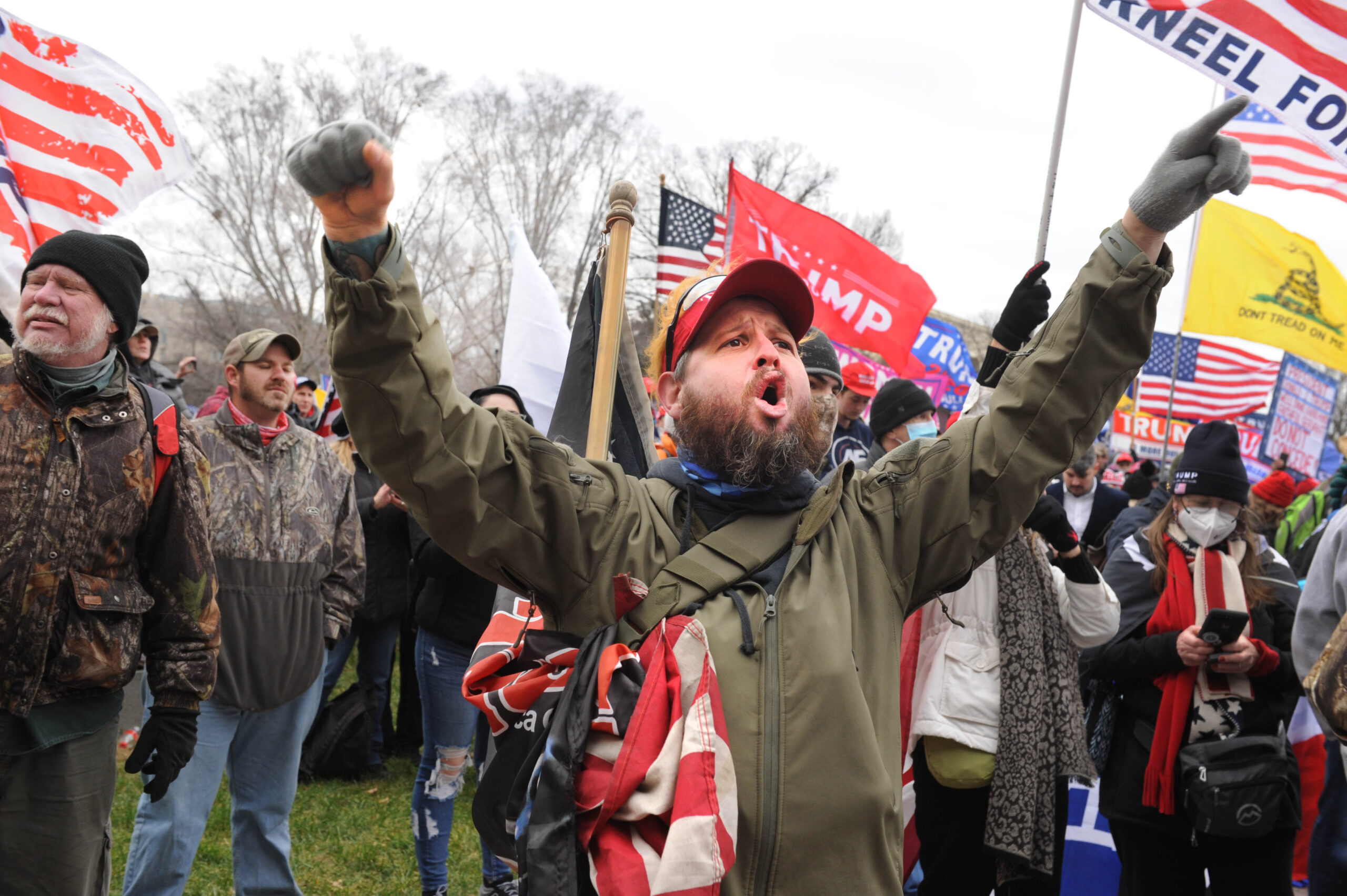
Protesters in Washington, Jan. 6, 2021 (Lloyd Wolf)
The dispute in Charlottesville, at least to hear the neo-Nazis tell it, was all about attempts by the Charlottesville city government to take down the statue of Robert E. Lee. We don’t think that that was what it was really about.
The defendants in the case and the organizers of the Charlottesville violence also often blamed everything on “antifa.” That they were going there because of antifa, and the problem was antifa. This specter of this huge, menacing thing called “antifa” was also something that has become all too prevalent in response to Black Lives Matter protests and in the recent election protests.
The use of disinformation is also significant. They talked a lot in the weeks leading up to Charlottesville about how they would make it look like self-defense and strategies for making it look like self-defense.
Today, if you follow groups like Identity Evropa and Proud Boys and others, they will often go and commit looting and throw stuff into shop windows and make it look like it was the Black Lives Matters protesters who did the vandalism.
And fourth, perhaps most disturbingly, is the use of cars to commit violence against protesters. A lot of the pre-Aug. 11 communication these guys had was about driving vehicles into protesters. In the last six months, I think there have been more than 60 incidents of people driving cars or other vehicles into protesters. So in ways that I never anticipated, Charlottesville has become a predictor, and sadly a symbol, of so many of the very serious problems that plague our society today.
We’ve also seen, since Charlottesville, two synagogue shootings, not to mention many other anti-Semitic attacks that, when you trace the shooters’ online activity, look very similar in terms of these chats.
There are all kinds of connections. The guy who did the shooting at the Tree of Life was in communication with defendants in our case. The guy who did the [mosque] shooting in Christchurch [New Zealand] had on his rifle a symbol called a fash tag, which is using fascist and hashtag, which was created by one of the defendants in our case, Matthew Heimbach.
We are suing the Charlottesville rioters under the KKK Act of 1871. But back then, and even in the 1920s, when the KKK got together to plan violence, they had to go into the forest wearing white hoods. Today, they just have to come up with a name for themselves, a hashtag on one of these websites. And I don’t think we fully come to appreciate how incredibly ominous all of this is.
It seems that your efforts are focused on litigating violence that occurs and tracing backwards to see where it comes from. But I wonder if there are more direct ways to prevent future attacks and slow the spread of online ideologies using legal tools?
Absolutely. So the FBI acknowledged at one point that they had kind of been asleep at the switch when it comes to the threat of right-wing, ultranationalist, white supremacist violence. They now say that it’s the No. 1 single security problem facing this country.
And law enforcement, especially federal law enforcement, knows what to do to counter groups like this. After all, they were very effective in doing it after 9/11. The only difference between those groups after 9/11 and the groups today is that the groups today are homegrown, and they’re not coming to the U.S. from countries in the Middle East.
But that shouldn’t make a difference. There’s no such thing as domestic terrorism under our statutes today. But those same efforts to track those groups need to happen — and honestly, I believe they are happening. And I’m quite sure that under the Biden administration, they will — I mean, given that Joe Biden has talked about Charlottesville so many times — that they will devote substantial resources to this.
The ACLU has taken a lot of flak for suing the city of Charlottesville to essentially help make this march happen. Do you think they were wrong to do so?
As far as I understand, they have acknowledged that they made a mistake. If all the guys had come to Charlottesville and just held up flags and swastikas, and just said, as horrific as it is, “back to the ovens,” as horrible as that is, they probably have a First Amendment right to do it.
But that’s not what happened in Charlottesville. Motivated by those beliefs, they came to Charlottesville intending to commit violence. And I think the ACLU has now acknowledged that had they known that, they never would have represented them in court.
This highlights a tension for me between the absolutist free speech position and the desire to prevent societal unrest and violence. Does this highlight something new that’s happening in American society to you? Has our legal system not caught up with how society is changing?
Legally, in terms of Supreme Court precedents and cases, we’ve always understood that there is a very clear line under the law between espousing hateful views and planning violence. Espousing hateful views, as bad as it is, and as damaging as it can be to society, the First Amendment protects that. On the other hand, everyone has always agreed that planning violence motivated by hateful views is illegal and can be prosecuted.
One of the problems that you have here is that technology and social media allow hateful views to be circulated in such a wide and instantaneous manner. It’s not like a bunch of neo-Nazis standing on a street corner in Skokie. Instead it’s literally hundreds, if not thousands of messages every hour on social media espousing these views.
Second, these groups have gotten very sophisticated about knowing when something looks like a threat and being careful not to make it look like a threat, even though they’re planning violence. Because they themselves have gotten schooled, sadly enough, in the principles of First Amendment law. And so they are very careful, while they sometimes cross the line, they are very careful in trying to say things that do not cross the line.
But regardless, if someone is saying things about planning violence at a rally, and using weapons and the kinds of things they were saying about Charlottesville before Aug. 11, there’s never been any doubt that that kind of stuff is illegal.
But what the government needs to do, I believe, is have more investigative techniques to follow these groups and catch them when they’re doing it.
I can’t help but ask, since you studied Russian history and literature and were active working with Soviet Jews, are there parallels that you see in American culture that echo some of the things that you witnessed while studying Soviet culture?
Thank God, and I really mean that, thank God that American society has institutions like courts and laws and professions in place that so far have been strong enough to withstand what these guys want, which is a fascist authoritarian state that enslaves minorities essentially.
So far, our institutions have held up. Those institutions did not exist in the Soviet Union. They didn’t exist in Russia before the Soviet Union. And that’s why Russian society is and was very different from the rest of the world, at least compared to other Western countries.
But I can say that growing up and living the life I did, I honestly never — I think many of us feel this way — never thought that I would be living through times that truly felt historic.
This country has obviously welcomed Jews in a way that no other country in the Diaspora ever has, and Jews have reached a level of success in the United States that is unprecedented. If you had told me while I was in college the kind of threats we’re facing in our country today, I would have told you that you were nuts.
After studying Russia and spending a semester in Russia in 1987, I never thought that we would be living in times that felt as important and as significant in terms of the future as things often felt in Russia and certainly felt in Russia when I was there in 1987.
When I was there, I was stupidly fearless. I was a college kid. And one of the things I did is I was at the train station and then a party when Yuli Edelstein was released from the gulag [after he was put there] for teaching Hebrew. I have a picture of me with Yuli and his father at the time. I’m not suggesting anything rises to that level — we’re not putting people in gulags — and I certainly never knew that Yuli Edelstein was going to become a leader in the Knesset. But I just thought that our society was protected from all that. Our country. And the truth is, we’re not.
You mentioned in an interview years ago that you “developed the philosophical sense that religion can serve as a bulwark against totalitarian governments.” Can you say a little bit more about that?
I very much believe that.
We know that human beings have great capacity for evil. And the institutions that have held back against that, that have somehow worked to make sure human beings treat each other with loving kindness, with chesed and with justice, with tzedakah, have been religious institutions.
Not that religion doesn’t have enormous, grievous harms that it has committed throughout human history. But it’s one of the institutions that has the ability to foster those values.
Seth Wispelwey, the reverend in our case, is a perfect example of that. And you can look at pictures of him during the events of Aug. 11 and 12 standing arm and arm with Cornel West and with the junior rabbi from the local synagogue and others. I don’t know how he had the bravery to do that, quite honestly. I think that bravery came from his faith. But I don’t want to suggest that that’s the only way for human beings to treat each other with dignity and respect, because it certainly isn’t.
If we can end on a positive note, what are you most looking forward to in the hopefully few months ahead once the pandemic is behind us.
Post-pandemic? I thought you were going to say post-inauguration!
Post-inauguration, I’m really looking forward to sleeping. Post-pandemic? One of the great things about living in New York City is being able to go to live theater, which I do a lot and I really miss it. And so I really look forward to the day I go to see a Broadway show as soon as it’s safe after the pandemic.
And being able to go to synagogue not on a computer screen.
JTA has documented Jewish history in real-time for over a century. Keep our journalism strong by joining us in supporting independent, award-winning reporting.
